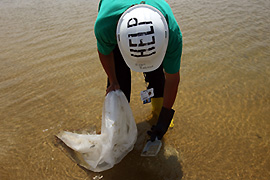Gulf oil slick nears Florida coast
Officials say oil could hit beaches within days as BP engineers struggle to plug leak.

Charlie Crist, the governor of the southern US state, said forecasters “are projecting whether the oil from the leading edge could impact the Florida Panhandle as early as this week, possible in a day or two.
“We are watchful, we are monitoring the situation, and we will do everything to protect our beautiful state”.
Fourth state
Florida would be the fourth state hit by the oil since an explosion on April 20 struck the BP operated Deepwater Horizon rig, killing 11 workers.
So far more than 200km of Louisiana coast have been contaminated, triggering long-term fears for the region’s already vulnerable coastal wetlands and native wildlife, including lucrative fishing grounds.
| in depth | |
|
Scientists from the University of Miami released a study on Wednesday showing the oil slick’s surface area had expanded to cover 24,435km sq of the Gulf – triple the size of satellite imagery from May 1.
Experts have also warned that most of the oil gushing from the well is contained in vast underwater plumes that cannot be measured by airborne or satellite analysis.
The latest warnings came as BP engineers reported a further delay in attempts to plug the oil leak after a diamond-edged saw became stuck while cutting through a thick pipe on the bottom of the Gulf of Mexico.
Situation unclear
Submersible robots have freed the saw, and BP said the effort was back on track.
But it remained unclear if engineers would ultimately succeed in their plans to cut and cap the gushing well.
The saw was being used to cleanly cut off the ruptured riser pipe at the top of a failed blowout preventer, to cap the end of the pipeline and then siphon the oil to a containment ship on surface.
 |
| Hundreds of kilometres of fragile coast is under threat from the spill [AFP] |
Currently, the best chance of stopping the leak remains the drilling of a relief well, but that is still at least two months from completion.
The US government, which has launched a criminal investigation into the disaster, has estimated the flow of oil to be around 12,000 to 19,000 barrels a day – meaning more than 75 million litres have poured into the Gulf since April.
In a speech on Wednesday, Barack Obama said the Gulf oil spill had highlighted the risks associated with oil drilling and called on the US to break its dependence on fossil fuels.
“An America run solely on fossil fuels should not be the vision we have for our children and grandchildren,” he said at Pennsylvania’s Carnegie Mellon University.
Obama said a price must be put on carbon pollution, and pledged to make a new push for the energy bill that has been stalled in the senate.
“The votes may not be there right now, but I intend to find them in the coming months,” he said.
